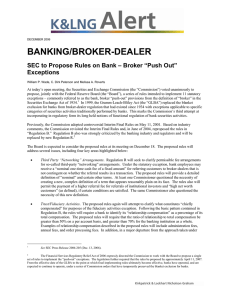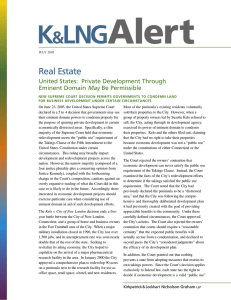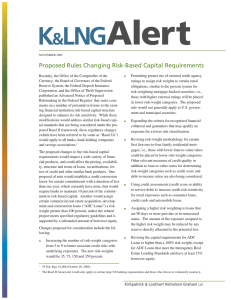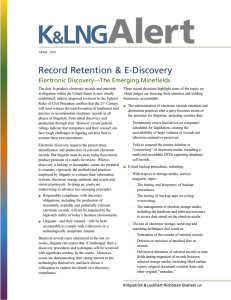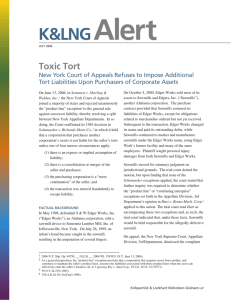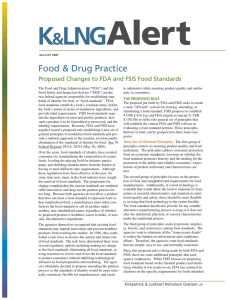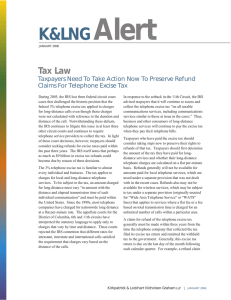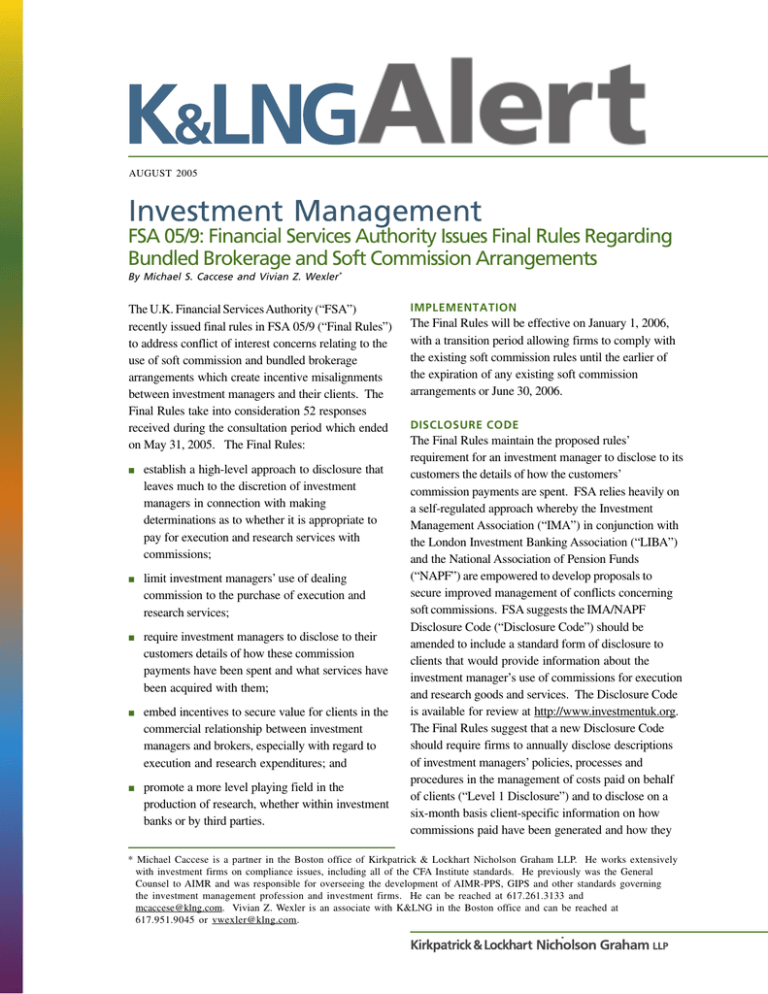
AUGUST 2005
Investment Management
FSA 05/9: Financial Services Authority Issues Final Rules Regarding
Bundled Brokerage and Soft Commission Arrangements
By Michael S. Caccese and Vivian Z. Wexler*
The U.K. Financial Services Authority (“FSA”)
recently issued final rules in FSA 05/9 (“Final Rules”)
to address conflict of interest concerns relating to the
use of soft commission and bundled brokerage
arrangements which create incentive misalignments
between investment managers and their clients. The
Final Rules take into consideration 52 responses
received during the consultation period which ended
on May 31, 2005. The Final Rules:
■
establish a high-level approach to disclosure that
leaves much to the discretion of investment
managers in connection with making
determinations as to whether it is appropriate to
pay for execution and research services with
commissions;
■
limit investment managers’ use of dealing
commission to the purchase of execution and
research services;
■
require investment managers to disclose to their
customers details of how these commission
payments have been spent and what services have
been acquired with them;
■
embed incentives to secure value for clients in the
commercial relationship between investment
managers and brokers, especially with regard to
execution and research expenditures; and
■
promote a more level playing field in the
production of research, whether within investment
banks or by third parties.
IMPLEMENTATION
The Final Rules will be effective on January 1, 2006,
with a transition period allowing firms to comply with
the existing soft commission rules until the earlier of
the expiration of any existing soft commission
arrangements or June 30, 2006.
DISCLOSURE CODE
The Final Rules maintain the proposed rules’
requirement for an investment manager to disclose to its
customers the details of how the customers’
commission payments are spent. FSA relies heavily on
a self-regulated approach whereby the Investment
Management Association (“IMA”) in conjunction with
the London Investment Banking Association (“LIBA”)
and the National Association of Pension Funds
(“NAPF”) are empowered to develop proposals to
secure improved management of conflicts concerning
soft commissions. FSA suggests the IMA/NAPF
Disclosure Code (“Disclosure Code”) should be
amended to include a standard form of disclosure to
clients that would provide information about the
investment manager’s use of commissions for execution
and research goods and services. The Disclosure Code
is available for review at http://www.investmentuk.org.
The Final Rules suggest that a new Disclosure Code
should require firms to annually disclose descriptions
of investment managers’ policies, processes and
procedures in the management of costs paid on behalf
of clients (“Level 1 Disclosure”) and to disclose on a
six-month basis client-specific information on how
commissions paid have been generated and how they
* Michael Caccese is a partner in the Boston office of Kirkpatrick & Lockhart Nicholson Graham LLP. He works extensively
with investment firms on compliance issues, including all of the CFA Institute standards. He previously was the General
Counsel to AIMR and was responsible for overseeing the development of AIMR-PPS, GIPS and other standards governing
the investment management profession and investment firms. He can be reached at 617.261.3133 and
mcaccese@klng.com. Vivian Z. Wexler is an associate with K&LNG in the Boston office and can be reached at
617.951.9045 or vwexler@klng.com.
have been used, including a split between
commissions spent on execution and research (“Level
2 Disclosure”). While use of the Disclosure Code
under the Final Rules is not mandatory so long as the
investment manager is able to demonstrate that the
level and content of disclosure to the client is
sufficient and appropriate (based on the investment
manager’s individual circumstances), FSA expects the
Disclosure Code, as amended, to become the standard
means for disclosure of commissions spent,
particularly for U.K. Institutional Funds and retail
funds. Some firms may choose to use it for non-U.K.
clients as a matter of good policy to uphold the
principles of transparency.
The Final Rules take note that the substance and types
of the disclosure made may be significantly different,
depending on the unique qualities of the business of
the investment manager. The FSA will monitor the
potential difficulties that may arise with respect to less
sophisticated customers, out of the flexibility allowed
by the Final Rules. The FSA expects firms to inform
their customers of the arrangements they have entered
into that involve the use of dealing commission to
purchase execution and research goods and services,
either with or before the earlier of the first periodic
disclosure made in 2006 or July 1, 2006.
DETERMINATION OF EXECUTION AND
RESEARCH GOODS AND SERVICES
The Final Rules implement the guidelines set forth in
the proposed rules for determining what constitutes
“execution” and “research” goods and services and
establish that permissible execution and research
goods and services must:
■
be related to the execution of trades for customers
or the provision of research; and
■
reasonably assist the investment manager in the
provision of its services to customers and not
impair its duty to act in the best interest of
customers.
Services provided by a broker (or other execution
service) that are demonstrably linked to the
arrangement and conclusion of a specific transaction
or series of related transactions will be considered to
fall within the definition of execution and research
goods and services. In addition, services provided by
a broker (or other execution service) that arise between
2 AUGUST 2005
the point at which the investment manager makes an
investment decision and the point at which the
transaction is concluded will also be considered to fall
within the ambit of the definition of execution and
research goods and services for the purposes of the
rule. The Final Rules specifically establish certain
non-permissible services for illustrative purposes as
follows:
■
services relating to the valuation or performance
measure of portfolios;
■
computer hardware;
■
dedicated telephone lines;
■
seminar fees;
■
subscriptions for publications;
■
travel, accommodation or entertainment costs;
■
office administrative computer software;
■
membership fees to professional associations;
■
purchase or rental of standard office equipment
and/or ancillary facilities;
■
employees’ salaries; and
■
direct money payments.
In addition, FSA determines that certain sales and
trading advice may be considered an execution
service if it can be attributed to a specific transaction
after the investment manager makes an investment
decision. The Final Rules further classify clearing and
settlement services (i.e., the netting of positions to
reduce costs, corresponding with sub-custodians on
specific trades, and resolving and reporting failed
trades) as included within the definition of execution
services. The Final Rules specify that Post-Trade
Analytics may not be considered to be execution
services, if the products provide information about the
quality of markets generally. However, FSA
determined that products used to examine the quality
of execution would be permissible as execution
services.
The Final Rules indicate that “research” goods and
services should be capable of adding value by
providing new insights that inform investment
managers when making investment decisions about
their clients’ portfolios. Research output should
represent original thought, have intellectual rigor and
KIRKPATRICK & LOCKHART NICHOLSON GRAHAM LLP
not merely state the readily apparent, and involve
analysis or manipulation of data to reach meaningful
conclusions. FSA does not, however, specify the form
that research must take in order to be a permissible
expenditure. The Final Rules further specify that the
“repackaging” of existing research is excluded from
the definition of “research services.” Research must be
original. However, the FSA determined that existing
material may be included in original research where
the final conclusion provides new insights. In
addition, research produced by a U.K. research
provider’s sister company in another country and then
passed on to a U.K. research provider’s customers
would be regarded as research, if it was not generally
available in the country already.
provide best execution does not automatically qualify
as an execution service. Investment managers must
always be able to justify the classification as an
execution service if they choose to classify something
as such.
Raw data feeds are not permitted to be considered
research services under the Final Rules, unless the data
has been manipulated into some form of output that is
sufficiently original. The Final Rules specifically
assert that a service or product that assists firms to
617.261.3133
3 AUGUST 2005
FSA expects, at a minimum, that investment managers
determine whether the execution and research goods
and services they propose to acquire with
commissions are permitted services and, if so, that
they disclose the costs involved and be able to justify
the decision to purchase such goods and services.
Michael C. Caccese
mcaccese@klng.com
Vivian Z. Wexler
vwexler@klng.com
617.951.9045
KIRKPATRICK & LOCKHART NICHOLSON GRAHAM LLP
If you have questions or would like more information about K&LNG’s Investment Management Practice,
please contact one of our lawyers listed below:
BOSTON
Michael S. Caccese 617.261.3133
Mark P. Goshko
617.261.3163
Thomas A. Hickey III 617.261.3208
Nicholas S. Hodge 617.261.3210
George J. Zornada 617.261.3231
mcaccese@klng.com
mgoshko@klng.com
thickey@klng.com
nhodge@klng.com
gzornada@klng.com
LONDON
Philip J. Morgan
44.20.7360.8123
pmorgan@klng.com
LOS ANGELES
William P. Wade
310.552.5071
wwade@klng.com
NEW YORK
Robert J. Borzone, Jr. 212.536.4029
Jeffrey M. Cole
212.536.4823
Ricardo J. Hollingsworth 212.536.4859
Beth R. Kramer
212.536.4024
Richard D. Marshall 212.536.3941
Keith W. Miller
212.536.4045
Scott D. Newman
212.536.4054
rborzone@klng.com
jcole@klng.com
rhollingsworth@klng.com
bkramer@klng.com
rmarshall@klng.com
kmiller@klng.com
snewman@klng.com
SAN FRANCISCO
Jonathan D. Joseph
David Mishel
Timothy B. Parker
Mark D. Perlow
Richard M. Phillips
jjoseph@klng.com
dmishel@klng.com
tparker@klng.com
mperlow@klng.com
rphillips@klng.com
415.249.1012
415.249.1015
415.249.1042
415.249.1070
415.249.1010
WASHINGTON
Clifford J. Alexander
Diane E. Ambler
Mark C. Amorosi
Catherine S. Bardsley
Arthur J. Brown
Arthur C. Delibert
Jennifer R. Gonzalez
Robert C. Hacker
Kathy Kresch Ingber
Michael J. King
Rebecca H. Laird
Deborah A. Linn
Cary J. Meer
R. Charles Miller
Dean E. Miller
Charles R. Mills
Jean E. Minarick
R. Darrell Mounts
C. Dirk Peterson
David E. Pickle
Alan C. Porter
Theodore L. Press
Francine J. Rosenberger
Robert H. Rosenblum
William A. Schmidt
Lori L. Schneider
Lynn A. Schweinfurth
Donald W. Smith
Martin D. Teckler
Robert A. Wittie
Robert J. Zutz
202.778.9068
202.778.9886
202.778.9351
202.778.9289
202.778.9046
202.778.9042
202.778.9286
202.778.9016
202.778.9015
202.778.9214
202.778.9038
202.778.9874
202.778.9107
202.778.9372
202.778.9371
202.778.9096
202.778.9029
202.778.9298
202.778.9324
202.778.9887
202.778.9186
202.778.9025
202.778.9187
202.778.9464
202.778.9373
202.778.9305
202.778.9876
202.778.9079
202.778.9890
202.778.9066
202.778.9059
calexander@klng.com
dambler@klng.com
mamorosi@klng.com
cbardsley@klng.com
abrown@klng.com
adelibert@klng.com
jgonzalez@klng.com
rhacker@klng.com
kingber@klng.com
mking@klng.com
rlaird@klng.com
dlinn@klng.com
cmeer@klng.com
cmiller@klng.com
dmiller@klng.com
cmills@klng.com
jminarick@klng.com
dmounts@klng.com
dpeterson@klng.com
dpickle@klng.com
aporter@klng.com
tpress@klng.com
francine.rosenberger@klng.com
rrosenblum@klng.com
william.schmidt@klng.com
lschneider@klng.com
lschweinfurth@klng.com
dsmith@klng.com
mteckler@klng.com
rwittie@klng.com
rzutz@klng.com
www
w.. k l n g . c o m
BOSTON DALLAS HARRISBURG LONDON LOS ANGELES MIAMI NEWARK NEW YORK PALO ALTO PITTSBURGH SAN FRANCISCO WASHINGTON
■
■
■
■
■
■
■
■
■
■
■
Kirkpatrick & Lockhart Nicholson Graham LLP (K&LNG) has approximately 1,000 lawyers and represents entrepreneurs, growth and middle market
companies, capital markets participants, and leading FORTUNE 100 and FTSE 100 global corporations nationally and internationally.
K&LNG is a combination of two limited liability partnerships, each named Kirkpatrick & Lockhart Nicholson Graham LLP, one qualified in Delaware, U.S.A.
and practicing from offices in Boston, Dallas, Harrisburg, Los Angeles, Miami, Newark, New York, Palo Alto, Pittsburgh, San Francisco and Washington and
one incorporated in England practicing from the London office.
This publication/newsletter is for informational purposes and does not contain or convey legal advice. The information herein should not be used or relied
upon in regard to any particular facts or circumstances without first consulting a lawyer.
Data Protection Act 1988 - We may contact you from time to time with information on Kirkpatrick & Lockhart Nicholson Graham LLP seminars and with our
regular newsletters, which may be of interest to you. We will not provide your details to any third parties. Please e-mail cgregory@klng.com if you would
prefer not to receive this information.
© 2005 KIRKPATRICK & LOCKHART NICHOLSON GRAHAM LLP. ALL RIGHTS RESERVED.



